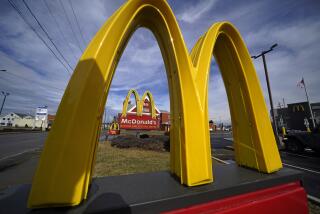Cheese Plant Connected to Illness Allowed to Reopen
- Share via
Rodeo Industries Inc., a City of Industry firm that made Mexican-style soft cheese allegedly linked to three listeriosis cases in Arizona, was given permission to reopen Tuesday amid some finger-pointing among state officials over the seriousness of the contamination.
The Listeria monocytogenes bacteria believed connected to a Rodeo product was the same potentially deadly strain linked to the cheese products produced by the now-padlocked Jalisco Mexican Products of Artesia. Jalisco’s contaminated cheese triggered a statewide epidemic and massive recall last year. Forty persons, mainly infants, died from Jalisco cheese poisoning, according to the state Department of Health Services.
Under the conditions imposed by state health and agriculture officials, the Rodeo plant must be re-sanitized--all table tops, containers, walls, floors and ceilings--before it can resume production.
Under a joint Agriculture Department-Health Services order on March 5, the company was shut down, halting production of its nine varieties of soft, white cheese, and was ordered to recall all of its cheese products in California, Arizona and Texas. The recall came after two Tucson women and a baby became ill with listeriosis in late February. The three had eaten Rodeo’s Queso Fresco brand cheese, and all recovered, authorities said.
Now, it appears that there was a slip-up in communications between the two key state agencies over the seriousness of the contamination.
At a March 6 news conference, Dr. Kenneth Kizer, health services director, said that state Department of Food and Agriculture investigators had told him that the Rodeo cheese contamination appeared to be “widespread.”
On the basis of that observation by Kizer, the company’s credibility in the marketplace was severely damaged and customers were lost, David Lopez, a Rodeo vice president, said Tuesday.
“I know it hurt,” Lopez said. “That’s all we heard” from the cheese distributors who began terminating business relationships with the firm. About $80,000 worth of cheese had to be destroyed during the recall, and the firm is trying to raise $150,000 to begin operations again, he said.
Now, “backed up” with creditors, Lopez said it was not clear when Rodeo could resume business.
Jan Wessell, communications director for the Agriculture Department, said Kizer’s assessment of the contamination was wrong.
“We didn’t tell him that,” she said. “We would never have called (the contamination) widespread. No one told (Kizer) it was widespread.”
An Agriculture Department inspection of more than 100 pounds of cheese in the plant turned up only one instance of listeria bacteria, Wessell said.
The three Arizona listeriosis cases, she said, have “never been (definitely linked) to any Rodeo product,” adding that, on balance, “our investigation revealed a plant that was clean and well-managed.”
Kizer told The Times on Tuesday that although Agriculture Department officials “did not say there was widespread contamination, that was the impression” they left with him during a conference telephone call in early March.
“Five other (Health Services) people were in the room with me,” Kizer said, “and we all came away from that conversation with that . . . impression.”
In any case, Kizer said, “the action (to shut down Rodeo) was perfectly consistent with the information we were working with at that time. Our mandate is to protect the public health. I have no qualms about it at all.”
More to Read
Inside the business of entertainment
The Wide Shot brings you news, analysis and insights on everything from streaming wars to production — and what it all means for the future.
You may occasionally receive promotional content from the Los Angeles Times.










